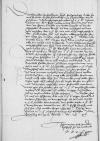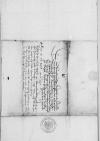Gestriges tages gen abent ist E(wer) F(urstlichen) D(urchlauch)t camer junge von ko(nigliche)m hoffe widder an uns kommen, / und uns von den herren Paweł Dunin-Wolski (Paweł Wolski) (†1546), 1533-1543 Starost of Gostynin; 1532-1537 Castellan of Sochaczew; 1537-1539 Vice-Chancellor of the Crown; 1537-1546 Burgrave of Cracow; 1539-1544 Grand Chancellor of the Crown; 1539-1544 Castellan of Radom; 1544-1546 Bishop of Poznań (after the death of his wife) (Urzędnicy 10, p. 214)⌊canczlerPaweł Dunin-Wolski (Paweł Wolski) (†1546), 1533-1543 Starost of Gostynin; 1532-1537 Castellan of Sochaczew; 1537-1539 Vice-Chancellor of the Crown; 1537-1546 Burgrave of Cracow; 1539-1544 Grand Chancellor of the Crown; 1539-1544 Castellan of Radom; 1544-1546 Bishop of Poznań (after the death of his wife) (Urzędnicy 10, p. 214)⌋ und Samuel Maciejowski (*1499 – †1550), humanist and diplomat, one of the most trusted advisors to King Sigismund I and then to his son Sigismund II Augustus; from 1521 Canon of the Collegiate Chapter in Sandomierz, and from 1530 in Kielce; from 1531 Canon of Gniezno; from 1532 or 1533 to 1537 royal secretary (previously scribe at the royal chancellery); 1537-1539 Grand Secretary; 1539-1547 Crown Vice-Chancellor; 1539-1541 Bishop of Chełm; 1541-1545 Bishop of Płock; 1545-1550 Bishop of Cracow; 1547-1550 Crown Grand Chancellor; in 1532 royal envoy to Rome; in 1534 and 1538 royal envoy to the local diets (WYCZAŃSKI 1990, p. 257-258; Urzędnicy 10, p. 184; PSB 19 Machowski - Maria Kazimiera, p. 64-69)⌊under canczlerSamuel Maciejowski (*1499 – †1550), humanist and diplomat, one of the most trusted advisors to King Sigismund I and then to his son Sigismund II Augustus; from 1521 Canon of the Collegiate Chapter in Sandomierz, and from 1530 in Kielce; from 1531 Canon of Gniezno; from 1532 or 1533 to 1537 royal secretary (previously scribe at the royal chancellery); 1537-1539 Grand Secretary; 1539-1547 Crown Vice-Chancellor; 1539-1541 Bishop of Chełm; 1541-1545 Bishop of Płock; 1545-1550 Bishop of Cracow; 1547-1550 Crown Grand Chancellor; in 1532 royal envoy to Rome; in 1534 and 1538 royal envoy to the local diets (WYCZAŃSKI 1990, p. 257-258; Urzędnicy 10, p. 184; PSB 19 Machowski - Maria Kazimiera, p. 64-69)⌋ uf unser schreÿben cf. Paweł DUNIN-WOLSKI to Ioannes DANTISCUS Cracow, 1540-04-11, CIDTC IDL 2303;
Samuel MACIEJOWSKI to Ioannes DANTISCUS Cracow, 1540-04-11, CIDTC IDL 2304⌊antwortcf. Paweł DUNIN-WOLSKI to Ioannes DANTISCUS Cracow, 1540-04-11, CIDTC IDL 2303;
Samuel MACIEJOWSKI to Ioannes DANTISCUS Cracow, 1540-04-11, CIDTC IDL 2304⌋ bracht, / die uns anzeigen und vor gut ansehen, / das E(wer) F(urstliche) D(urchlauch)t, wie wir auch negst cf. Ioannes DANTISCUS to Albrecht I von Hohenzollern-Ansbach Guttstadt (Dobre Miasto), 1540-03-30, CIDTC IDL 4912⌊geschriebencf. Ioannes DANTISCUS to Albrecht I von Hohenzollern-Ansbach Guttstadt (Dobre Miasto), 1540-03-30, CIDTC IDL 4912⌋, / zubesuchen Sigismund I Jagiellon (Zygmunt I) (*1467 – †1548), King of Poland and Grand Duke of Lithuania (1506-1548); Duke of Głogów (Glogau) (1499-1506), Duke of Opava (1501-1506), Governor of Silesia (1504-1506); son of King Kazimierz IV Jagiellon and Elisabeth of Austria⌊ko(niglich)e m(aieste)tSigismund I Jagiellon (Zygmunt I) (*1467 – †1548), King of Poland and Grand Duke of Lithuania (1506-1548); Duke of Głogów (Glogau) (1499-1506), Duke of Opava (1501-1506), Governor of Silesia (1504-1506); son of King Kazimierz IV Jagiellon and Elisabeth of Austria⌋, unsern aller gnedigisten hern, ym wege gen Lithuania⌊LittenLithuania⌋ / nicht underlisse. / Melden aber doneben, das Sigismund I Jagiellon (Zygmunt I) (*1467 – †1548), King of Poland and Grand Duke of Lithuania (1506-1548); Duke of Głogów (Glogau) (1499-1506), Duke of Opava (1501-1506), Governor of Silesia (1504-1506); son of King Kazimierz IV Jagiellon and Elisabeth of Austria⌊ir m(aieste)tSigismund I Jagiellon (Zygmunt I) (*1467 – †1548), King of Poland and Grand Duke of Lithuania (1506-1548); Duke of Głogów (Glogau) (1499-1506), Duke of Opava (1501-1506), Governor of Silesia (1504-1506); son of King Kazimierz IV Jagiellon and Elisabeth of Austria⌋ bis gen der Vilnius (Wilno, Vilna), city in Lithuania, on the Vilnia river, capital of the Grand Duchy of Lithuania⌊WilneVilnius (Wilno, Vilna), city in Lithuania, on the Vilnia river, capital of the Grand Duchy of Lithuania⌋ nindert im zoge uber ein nacht wirt vorharren, / wie solchs ane zweifel aus schrifften von hofe, / und was sonst do / und aus Hungary (Kingdom of Hungary)⌊HungarnHungary (Kingdom of Hungary)⌋ newes ist, / E(wer) F(urstliche) D(urchlauch)t klerlicher wirt vornehmen. / Uns ist auch ein cf. Albrecht I von Hohenzollern-Ansbach to Ioannes DANTISCUS Königsberg, 1540-04-06, CIDTC IDL 6328⌊brieffcf. Albrecht I von Hohenzollern-Ansbach to Ioannes DANTISCUS Königsberg, 1540-04-06, CIDTC IDL 6328⌋ von E(wer) F(urstlichen) D(urchlauch)t worden vor den edeln, ernvhesten h(ern) Friedrich von der Ölsnitz (*1490 – †1553), at least in 1539-1550 grand marshal of duke Albrecht von Hohenzollern; captain (Hauptmann) of Hohenstein (HARTMANN 1525-1550)⌊Friedrichen von OlsnitzFriedrich von der Ölsnitz (*1490 – †1553), at least in 1539-1550 grand marshal of duke Albrecht von Hohenzollern; captain (Hauptmann) of Hohenstein (HARTMANN 1525-1550)⌋, / heubeman zum Hohenstein (Olsztynek), town in Ducal Prussia, 26 km S of Allenstein (Olsztyn)⌊HoensteinHohenstein (Olsztynek), town in Ducal Prussia, 26 km S of Allenstein (Olsztyn)⌋, E(wer) F(urstliche) D(urchlauch)t obermarschalk, von wegen seiner mulhen, die er uff unserm und unsers Ermland Chapter cathedral chapter based in Frauenburg (Frombork, Varmia)⌊w(irdigen) capittelsErmland Chapter cathedral chapter based in Frauenburg (Frombork, Varmia)⌋ halben strome zu bawen vorgenommen, / worynne wir E(wer) F(urstliche) D(urchlauch)t zugefallen gedachtem E(wer) F(urstliche) D(urchlauch)t ober marschalh, / dem wir mit sondern gunsten gewogen, / so vil uns ummer muglich und fueglich, gerne wollen forderlich sein. / Es mag aber derhalben bequemer weiss nicht eher, biss im November nach aller heÿligen tage, / uff welche zeit bei unser kirchen ein general capittel gehalten wirt, gehandelt werdenn. / Was wir zur selbten zeit uf E(wer) F(urstlichen) D(urchlauch)t vorschrifft neben unserm Ermland Chapter cathedral chapter based in Frauenburg (Frombork, Varmia)⌊w(irdigen) capittelErmland Chapter cathedral chapter based in Frauenburg (Frombork, Varmia)⌋ zu willen mugen ausrichten, / sal an unserm vleis nichts abgehen. / Nechten spet ist auch ein loffender bott mit E(wer) F(urstlichen) D(urchlauch)t cf. Albrecht I von Hohenzollern-Ansbach to Ioannes DANTISCUS Neuhausen, 1540-04-20, CIDTC IDL 4867⌊eigen handtcf. Albrecht I von Hohenzollern-Ansbach to Ioannes DANTISCUS Neuhausen, 1540-04-20, CIDTC IDL 4867⌋ und anderm schreiben an uns gelangt, / bei dem wir weiter E(wer) F(urstliche) D(urchlauch)t wollen beantworten, / und haben diesen E(wer) F(urstlichen) D(urchlauch)t camerjungen, / dieweil er von ko(nigliche)m hoffe brieffe mit sich hat, nicht wollen lenger ufhalten. / Thuen uns hiemit in E(wer) F(urstlichen) D(urchlauch)t gunst vortrawlich befelhen.
 GStA PK, HBA, C1 No 665, 2 unnumbered
GStA PK, HBA, C1 No 665, 2 unnumbered  GStA PK, HBA, C1 No 665, 1 unnumbered
GStA PK, HBA, C1 No 665, 1 unnumbered 
